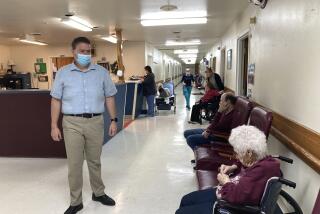State Looking Into HMO’s Vaccine Policy
- Share via
CYPRESS — The state of California said Tuesday that it will investigate whether PacifiCare of California is violating state law by refusing to recommend a chicken-pox vaccine to its members.
The HMO, a statewide subsidiary of PacifiCare Health Systems Inc. in Cypress, has come under fire from a consumer group for failing to endorse the widely accepted preventive measure.
The vaccine has been on the market since May, and federal guidelines recommend vaccinations for young children and others with a high risk of contracting the disease.
PacifiCare covers the vaccination as a health benefit, but the company doesn’t recommend it, a policy that the state Department of Corporations says may violate state law. The law requires HMOs and other health-care providers to follow federal recommendations.
The HMO’s policy places its members in the difficult position of having to keep up with “every new and latest technology coming in” and to “ask for it with every procedure,” said Damian Jones, a spokesman for the state agency.
“It’s not the intent of the law to cover something and not recommend it to your patients,” Jones said.
The company’s policy has come under sharp criticism from Consumers for Quality Care in Santa Monica. PacifiCare’s refusal to endorse the vaccine is an attempt to “redefine medical science” to save “a few bucks,” asserts Jamie Court, the consumer group’s director.
Dr. William Osherhoff, the HMO’s medical director, said that while PacifiCare covers the vaccination as a health benefit, the company doesn’t recommend it because of medical, not financial, considerations.
He said the company would stand by its policy against universal immunizations. “We cover appendectomies, but we don’t recommend those for everybody either,” he said.
Osherhoff contends that state law doesn’t require HMOs to promote the vaccination but only to provide coverage. Nevertheless, he said, the company may start recommending the vaccine for a limited number of children at risk of serious complications.
About 3.7 million Americans contract the generally mild disease each year, according to the federal government. For some, though, chickenpox is a serious illness. About 9,300 patients are hospitalized each year with chickenpox, and 50 to 100 people, mostly young children, die.
About a year ago, drug giant Merck & Co. of Whitehouse Station, N.J., received regulatory approval to market the first chicken-pox vaccine domestically.
Sales have taken off faster than for any vaccine the company has marketed since it began selling a measles vaccine in the 1960s. Thus far, 2 million doses have been sold.
The vaccine, which costs about $40 a dose, has been recommended by leading government and medical authorities, including the Centers for Disease Control and Prevention’s advisory committee on immunizations, the American Academy of Pediatrics and the American College of Physicians.
Osherhoff contends that researchers have yet to prove whether the vaccine will prevent the disease from occurring throughout a person’s life. He noted that a generation ago, it was common practice for children to receive tonsillectomies, though that practice has since fallen out of favor.
Merck officials said the company is confident that research will prove the vaccine’s long-term efficacy.
Merck said PacifiCare is the only HMO it knows about that isn’t recommending vaccinations. It’s unclear, however, if all other California HMOs are promoting the vaccine.
A spokesperson for the California Assn. of Health Maintenance Organizations, a trade group, said a quick poll Tuesday of eight of the largest organizations indicated that some promote the vaccine more “vigorously” than others.
More to Read
Inside the business of entertainment
The Wide Shot brings you news, analysis and insights on everything from streaming wars to production — and what it all means for the future.
You may occasionally receive promotional content from the Los Angeles Times.










